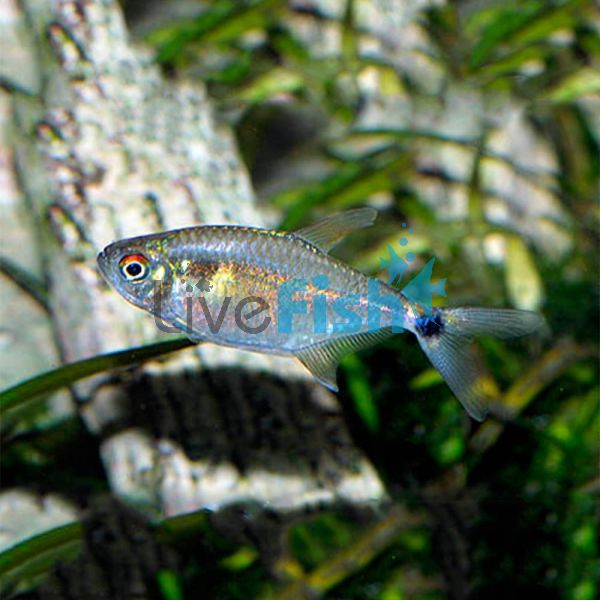Head & Tail Light Tetra 3.5cm
The Head & Tail Light Tetras have been a long-available but quite underrated species in the aquarium hobby. These are fantastic larger-growing tetra species that are perfect to fill out a larger aquarium. Due to the unawareness of the head & tail light tetra along with the often drab colours as juveniles, these fish are often overlooked and not common in aquarium stores.
Head & Tail Light Tetra
The Head & Tail Light Tetras have been a long-available but quite underrated species in the aquarium hobby. These are fantastic larger-growing tetra species that are perfect to fill out a larger aquarium. Due to the unawareness of the head & tail light tetra along with the often drab colours as juveniles, these fish are often overlooked and not common in aquarium stores.
These fish have a more oval body shape in comparison to some of the classic tetra species like neon’s, they also get fairly large reaching a maximum size of 5 cm making them a great option for smaller aquariums. As their name suggests the head & tail light tetras have a striking red streak across the top of the eye and a similar red spot at the start of the tail. The rest of the body is a dark grey with hints of emerald green, gold, and silver that carries into the fins. The belly and face area on this species is a golden white colour and whilst it may seem like the fish is overly contrasting the colours all work together perfectly for a cohesive and very wild looking fish. The head & tail light tetra also schools relatively well and is a laid-back, peaceful fish that is perfect to accentuate a planted aquarium or to just add some volume to a community tank.
Head & Tail Light Tetra are tropical species that thrive in temperatures between 24-28 degrees. They are also extremely peaceful fish but feel best when kept in schools of 6 as a minimum but ideally, 10 or more would be perfect. breeding these fish in the home aquarium is not common due to their lack of popularity, but it is possible. Females tend to be more rounder-bellied than males and will scatter eggs through the aquarium and males follow by fertilizing. The wild origin of head & tail light tetras is South America.
Tank Recommendations for your Head & Tail Light Tetra
Being relatively easy to care for fish the head & tail light tetra can be kept in nano aquariums with the minimum being 70 litres. This aquarium size allows for a decent school of these tetras along with other community fish if required. The substrate choice is not of concern as long as it does not elevate the PH as these fish prefer softer water with a PH between 6.0 - 7.0. A unique aquarium setting for these fish would be a biotope or blackwater aquarium as their head & tail light colour will stand out.
Suitable Tank Buddies
The head & tail light tetra is an extremely peaceful fish that displays no aggression or fin-nipping behaviour They can be kept with a wide range of fish being top, bottom, and mid dweller fish.
Usually Compatible
Angelfish, glow light tetras, neon tetras, Apistogramma, rams, and a range of dwarf/nano peaceful fish.
Sometimes Compatible
Larger semi-aggressive fish such as convict cichlids, severum, and species that may show prolonged aggression towards the head & tail light tetra.
Rarely Compatible
Large and aggressive species that may prey on the head & tail light tetra along with any incredible nano species such as shrimp.
Feeding your Head & Tail Light Tetra
Head & Tail Light Tetras much like any other tetra species are very easy fish to feed. They will take a wide range of pellets, flakes, and frozen foods. Just like any fish though they should be fed a varied diet with a mix of different foods. The ideal diet would be a good quality micro slow-sinking pellet or flake, supplemented with frozen bloodworms or black worms or even live foods like baby brine shrimp.
| Scientific Name | Hemigrammus ocellifer |
|---|---|
| Care Level | Easy |
| Common Names | Head and Tail light tetra |
| Diet | Omnivore |
| Fish Family | Characidae |
| Lifespan (years) | 5 |
| Max. Length (cm) | 5 |
| Min. Tank Volume (l) | 70 |
| Origin | South America |
| Reef Safe | Yes |
| Sociability | Peaceful |
| Venomous | No |
| Water Conditions | 24-26° C, pH 6.0-7.0 |




